Biculturalism and Psychological Well-Being: Investigating the Role of Socioeconomic Status
Résumé
This online study investigated the role of socioeconomic status in previously established relationships between bicultural identity integration (or bicultural self-efficacy) and psychological well-being (or life satisfaction) among bicultural immigrant students at a large Canadian university (N = 403). A comprehensive measure of socioeconomic status was utilized to measure income, level of education, and occupational status of participants’ guardians, as well as to determine participants’ access to financial resources and sources of psychosocial supports and stressors (in the domains of interpersonal relationships, home and neighbourhood environment, individual health, and religious affiliation). The study found that socioeconomic status is responsible for a large variance in the relationship between bicultural identity integration (or bicultural self-efficacy) and psychological well-being (and life satisfaction). Within socioeconomic status, the domains of interpersonal relationships and surrounding environment were significant contributors to these relationships, while guardians’ incomes, levels of education, and occupational statuses were insignificant along with participants’ financial resources, individual health, and religious affiliation.
Téléchargements
Publié-e
Comment citer
Numéro
Rubrique
Licence
LicenceLes auteurs qui contribuent à la Revue YOUR Review acceptent de publier leurs articles selon une des trois catégories de la licence 4.0 : Creative Commons Attribution 4.0 International; Creative Commons Attribution-Pas d'Utilisation Commerciale 4.0 International; ou Creative Commons Attribution-Pas de Modification 4.0 International. Tout contenu éditorial de ce site ainsi que les affiches et les résumés sont sous la licence Creative Commons Attribution-Pas de Modification 4.0 International. Pour plus d’informations, veuillez voir :
https://creativecommons.org/licenses/
Dans tous les cas, les auteurs conservent leurs droits d’auteurs et concèdent à la Revue YOUR Review le droit de première publication. Les auteurs peuvent, par la suite, conclure d’autres accords de distribution non exclusifs de la version publiée dans ce périodique (par exemple, l’afficher à un dépôt institutionnel ou le publier dans un livre ou dans un autre périodique) à condition que la reconnaissance fasse mention de la publication originale dans la Revue YOUR Review.


